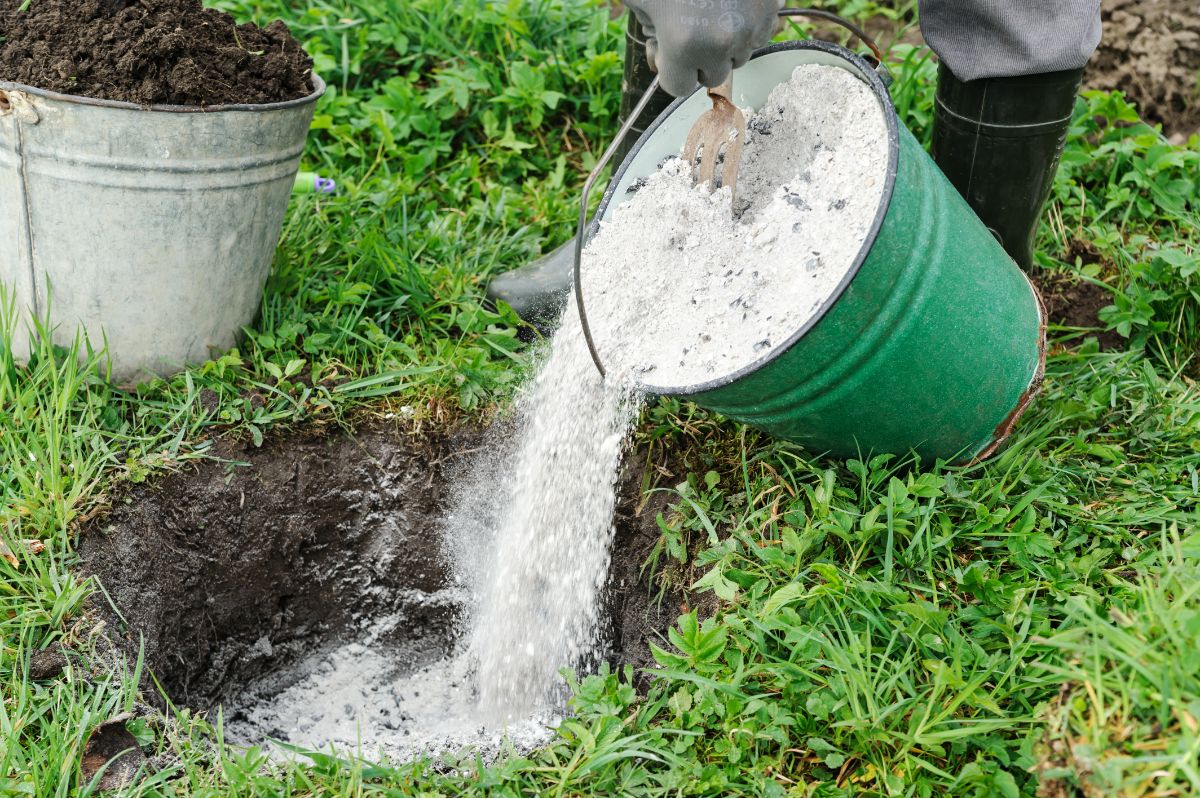Yes, ash can be used as fertilizer. It is a good source of potassium and other minerals that can help plants grow. However, it is important to use ash from wood that has been burned completely.
Otherwise, it may contain harmful chemicals that could damage plants.
If you have ash from a wood-burning stove, you can use it as fertilizer for your garden. Wood ash is high in potassium and other nutrients that plants need. Be sure to spread the ash around evenly, and don’t put too much on any one plant.
You can also add ashes to compost to help speed up the decomposition process.
From The Ashes Comes Life Again – Homemade Fertilizer – Potassium / Calcium / Magnesium – Wood Ashes
What Plants Like Ashes As Fertilizer?
If you have wood ashes from a fireplace or campfire, you may be wondering if they can be used as fertilizer for your garden. The answer is yes! Wood ashes contain potassium and other minerals that can benefit plants, making them an excellent organic fertilizer.
However, there are a few things to keep in mind when using ashes as fertilizer.First, it’s important to make sure the ashes are completely cooled before applying them to your garden. You don’t want to risk burning your plants with hot ashes.
Second, it’s best to mix the ashes with other organic matter such as compost before spreading them on your garden beds. This will help to prevent any potential damage from too much ash buildup in one area. Finally, don’t apply wood ashes directly to seedlings or young plants; they may be too strong for these delicate little ones.
Wait until seedlings are a few inches tall before giving them a light dusting of wood ash fertilizer.
What Plants Don’t Like Wood Ash?
Wood ash is a great source of nutrients for plants, but there are some plants that don’t like it. Wood ash can be too alkaline for some plants and can burn their roots. Plants that don’t like wood ash include azaleas, rhododendrons, gardenias, camellias, blueberries, and potatoes.
If you have any of these plants in your garden, you should avoid using wood ash around them.
Is Ash Good for All Plants?
Most people think that ash is only good for plants that need lots of potassium, like tomatoes and potatoes. But ash can be beneficial for all plants, not just those that are potassium-hungry.Ash contains many different minerals and nutrients that can help your plants grow strong and healthy.
For example, it has calcium which helps prevent blossom end rot in tomatoes, and magnesium which helps prevent chlorosis (yellowing) in leaves.It also contains trace elements like manganese and zinc which are important for plant growth but are often lacking in soil. And because ash is a natural product, it doesn’t contain any harmful chemicals or pollutants.
So if you’re looking for a way to give your plants a boost, adding some ash to their diet is a good idea!
How Do You Use Wood Ash As Fertiliser?
Wood ash can be used as a fertilizer to improve the condition of your soil. It is high in potassium and other minerals which can help to promote plant growth. To use wood ash as a fertilizer, simply spread it over the surface of your soil and dig it in lightly.
You can also add it to compost heaps or worm farms to boost their nutrient content.


Leaf Ash As Fertilizer
Ash from leaves can be used as a fertilizer for your garden. The nutrients in the ash will help to promote growth in your plants. You can use fresh or dry leaves for this purpose.
If you use fresh leaves, you will need to shred them first. Then, add the shredded leaves to a bucket of water and let them soak for 24 hours. After soaking, strain the water and pour it over your plants.
If you use dry leaves, you can simply grind them up and sprinkle them around your plants.
Using Human Ashes As Fertilizer
When it comes to human ashes as fertilizer, there are a few things to keep in mind. First, it is important to understand that using human ashes as fertilizer is different than using them as compost. Composting ash is the process of breaking down organic matter, such as leaves and grass clippings, into a nutrient-rich soil amendment.
This can be done through either thermal or cold composting methods. On the other hand, applying ashes directly to the soil is known as “fertilizing” and is often used when trying to raise the pH levels of acidic soils. Now that we’ve got that out of the way, let’s talk about how human ashes can be used as fertilizer.
Human ashes contain a high concentration of nutrients, including potassium and phosphorus. These nutrients are essential for plant growth and can help promote healthier plants with more bountiful yields. In addition, applying human ashes to the soil can help increase its ability to retain water – making it an ideal amendment for drought-prone areas.
If you’re interested in using human ashes as fertilizer, there are a few things you should keep in mind. First, make sure that the Ashes are completely cooled before application. Applying hot Ashes to plants can damage their root systems.
Second, because Ashes are high in alkaline levels (pH), they should only be applied to gardens with plants that thrive in alkaline soils; if not properly monitored, adding too much ash to your garden could make it unsuitable for growing certain plants altogether. Finally – and this one goes without saying – be sure not use Ashes from someone who had any communicable diseases; you don’t want to inadvertently spread illness! With these guidelines in mind, fertilizing with human ashes can be a great way to give your garden a nutrient boost while also helping improve its water retention capabilities – making it more resistant to drought conditions.
So why not give it try? Your plants will thank you!
Charcoal Ash As Fertilizer
Did you know that charcoal ash makes great fertilizer? That’s right – the same stuff you use to cook your food can be used to help your plants grow.Charcoal ash contains a high concentration of potassium, which is essential for plant growth.
It also helps to improve drainage and aeration in soils. And because it’s highly absorbent, it can help to hold onto nutrients in the soil so they’re not washed away by rain or watering.To use charcoal ash as fertilizer, simply sprinkle it around the base of your plants.
You can also add it to compost piles or mix it into the soil before planting. Just be sure not to use too much, as too much ash can make soils too alkaline.If you have access to wood ashes, give them a try as fertilizer – your plants will love you for it!


What Plants Like Wood Ash As Fertilizer
Wood ash is a type of fertilizer that can be beneficial for plants. It is high in potassium and other minerals that can help plants to grow. Wood ash can also help to improve the drainage and aeration of soils.
Paper Ash As Fertilizer
If you’re looking for a sustainable, eco-friendly way to fertilize your garden, look no further than paper ash! Paper ash is the residue left over from burned paper and can be used as a nutrient-rich fertilizer. Here’s everything you need to know about using paper ash as fertilizer for your garden.
Paper ash contains high levels of potassium and phosphorus, which are essential nutrients for plant growth. In addition, paper ash also contains other minerals that can benefit plants, including calcium, magnesium, and sodium. When using paper ash as fertilizer, it’s important to apply it in moderation.
Too much paper ash can actually be harmful to plants, so it’s best to use it sparingly. A general rule of thumb is to mix one part paper ash with 10 parts soil. Paper ash should be incorporated into the soil before planting or sowing seeds.
For best results, mix the paper ash into the top few inches of soil where it will come into contact with plant roots. If you have any leftover paper ash after fertilizing your garden, don’t throw it away! You can use it around the house in other ways such as deodorizing shoes or freshening up smelly drains.
30 Uses for Wood Ash
Wood ash can be used in many different ways. Here are 30 uses for wood ash:
1. As a fertilizer: Wood ash contains potassium and other minerals that can be beneficial to plants. It can be used as a fertilizer for garden beds or potted plants.
2. To make lye: Lye is a caustic substance that is often used in making soap. It can also be used for cleaning drains and ovens. To make lye, mix wood ash with water and let it sit for 24 hours before straining it through a cloth.
3. As an abrasive: Wood ash can be used as an abrasive material for scrubbing pots and pans or cleaning grout lines.
4. As insulation: Wood ash makes excellent insulation material due to its high carbon content. It can be used to insulate homes or other buildings.
5. For making paper: The fibers in wood ash can be used to make paper products such as paper towels and toilet paper.
6 . In the garden: Wood ash can be sprinkled around the base of plants to deter slugs and snails, or added to compost piles to speed up decomposition. It can also be mixed with water to create a “slug beer” trap.
Simply bury a container half-filled with wood ashes near your plants, then fill it the rest of the way with beer. Slugs will crawl in and drown!
Wood Ash As Fertilizer Research
Wood ash has been used as a fertilizer for centuries, and it’s still a popular choice for many gardeners today. Ash contains high levels of potassium and other minerals that can be beneficial to plants. It also helps to improve soil drainage and aeration.
If you’re thinking of using wood ash in your garden, there are a few things you should keep in mind. First, only use ashes from clean wood – avoid ashes from treated wood or charcoal briquettes. Second, don’t apply too much ash at once – a light sprinkling is all that’s needed.
And finally, test your soil before using wood ash to make sure it won’t cause problems with pH levels.If you follow these guidelines, using wood ash as fertilizer can be a great way to give your plants a boost.
Disadvantages of Wood Ash in Agriculture
Wood ash has many disadvantages when it comes to agriculture. One of the biggest problems is that it can change the pH of the soil, making it more acidic. This can be harmful to plants, as well as the microorganisms that live in the soil.
Wood ash can also contain high levels of potassium and other minerals which can lead to imbalances in the soil. Another problem with wood ash is that it can bind with essential nutrients in the soil, making them unavailable for plants to use. Finally, wood ash can also contain toxins such as heavy metals which can contaminate both the soil and any crops grown in it.
Conclusion
Ash can be an excellent fertilizer for your garden. It provides essential nutrients that plants need to grow, and it can help improve soil fertility. If you’re looking for a natural way to fertilize your garden, ash is a great option.






